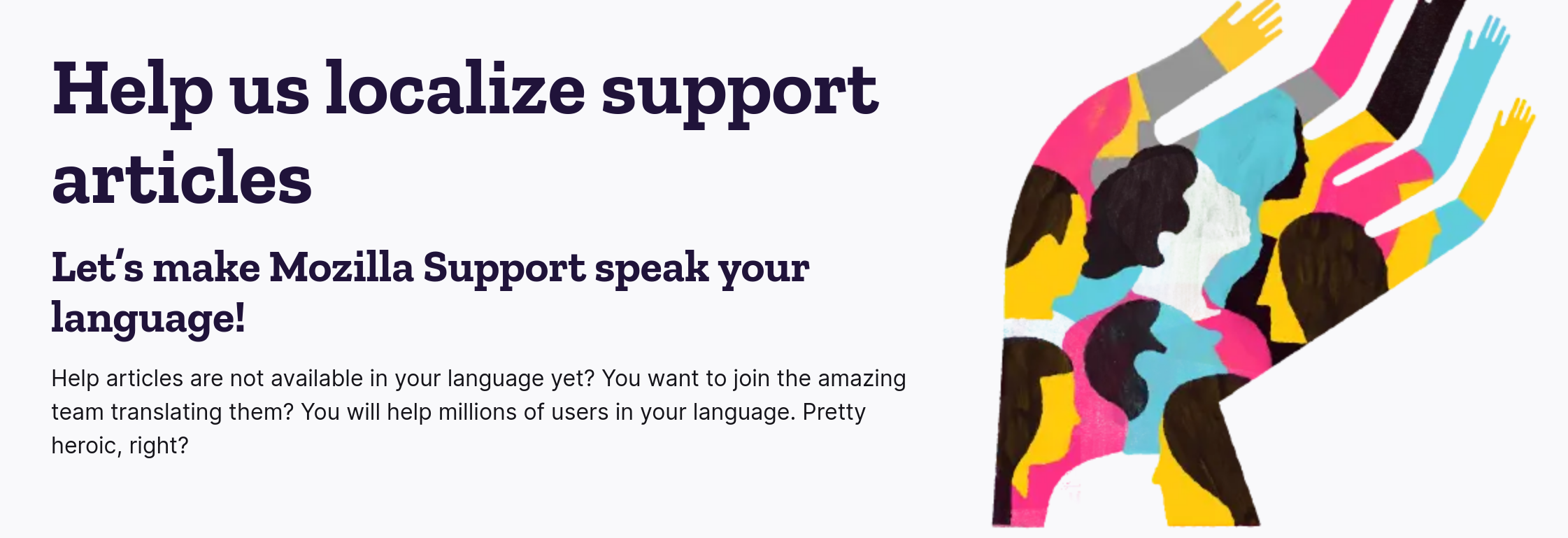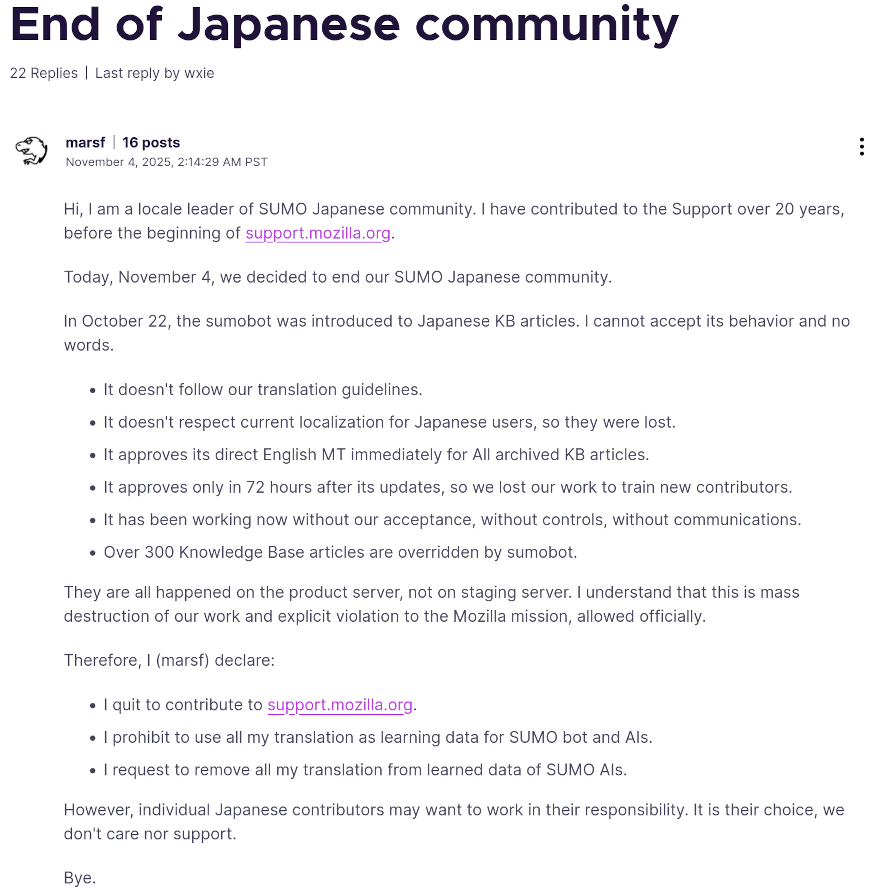TL;DR: Mozilla is killing localization on Support Mozilla, overwriting articles written by humans with machine generated translations. Although Mozilla knows that their AI doesn’t localize or adhere to style guides, Mozilla is going live with it anyway. I thank locale leaders and localizers for their tireless efforts. Locale leaders seem to be obviated by AI, and Mozilla has nothing to say about it.
I made a video if you want to watch instead.
My post about the deeper implications of what Mozilla is doing to the Support Mozilla community is coming, but I figured over the Thanksgiving holiday that I could focus on giving thanks.
While the title of this post is a bit tongue in cheek, I realized that some people didn’t know what was going on. Support Mozilla isn’t Firefox or Thunderbird, and if you aren’t aware of developments in AI or communities you might not be clear how it all affects you, a Mozilla user.
Support Mozilla (SUMO)
Support Mozilla is Mozilla’s helpdesk and knowledgebase.
This is where you can get help for Mozilla products like Firefox and Thunderbird. The products themselves also link to the knowledgebase, in place of in-product documentation.
Contributions
The helpdesk and knowledgebase are all volunteer driven, and people spend hours of their time helping other people use and troubleshoot Mozilla products.
Mozilla isn’t shy about asking for people’s help on the Support Mozilla website - their website says “save the world from the comfort of your couch”.

Contributors can answer support questions, write help articles, and they can also localize support content.
Mozilla is pretty complimentary towards their localizers, calling them “heroic”.

Japanese Locale Leader Resigns
On November 4, the locale leader of the Japanese Support community on SUMO very publicly resigned.

You should read what marsf said themselves, but here’s my summary:
marsf has been contributing to Mozilla for over 20 years, even before Support Mozilla existed.
They were a locale leader, someone who coordinates localization efforts for a locale.
Mozilla enabled machine translation on the Japanese locale on October 22. marsf quit on November 4. It took less than two weeks to scare away someone who had spent 20 years contributing to the Mozilla mission.
Locale Leaders
Prior to the introduction of machine translation, locale leaders were a core part of the localization process.
On Mozilla’s knowledgebase article for localization contributions, the documented process is to send a locale leader a private message to get started.
Let’s take a look at the kinds of things you do as a locale leader:
- Greet new members of the SUMO community who want to localize into your language
- Work together with other Locale Leaders and Reviewers on guiding all Editors in their work:
- through 1:1 mentoring on language and quality
- through documentation (for example, a Style Guide for your locale)
- Provide fair reviews of contributions provided by all Editors in your locale – and provide constructive feedback on their quality, which includes:
- Approving good revisions and encouraging Editors to continue their great work
- Rejecting revisions that can be improved, and letting their authors know what and why could be better
You can see that locale leaders do a lot of work to build community around localization.
This is all work that Mozilla is throwing away in its move to machine translation.
Resignation
It is easy to see why marsf is angry and in pain. As a locale leader, marsf maintained the Japanese style guide. As a contributor for over 20 years, marsf likely had a hand in nearly every article on the locale.
Those were the articles that were overwritten by Mozilla and its machine translation bot, sumobot. The overwritten articles represented years of effort - a real labor of love, given that volunteers are unpaid.
Without discussion, without communication, without testing, untold years of human effort were overwritten by a machine with no love in its heart.
It is obvious that locale leaders are unable to foster a culture to train new contributors in process and style if AI is providing machine translations.
Thank You, marsf
Thank you for the over 20 years as a Mozillian. Thank you for helping Mozilla build culture. Thank you for helping millions of Japanese Mozilla fans. Thank you for caring.
Check out marsf’s profile on SUMO - they’ve got a lot of badges!
Localization
Some commenters say that none of this really matters. Machine translations are good now, it’s not like we’re really missing anything.
I got a great comment from pandakekok9 that dispels that notion. They say that Mozilla shouldn’t be calling what sumobot is doing “localization” if what it is doing is translation:
If that was the intent Mozilla, maybe don’t call what you’re doing “localization” then and just call it literal translation? A crucial difference between localization and translation is that former DOES add and change stuff that would not be found or recognizable in the original. As much as localization gets flak recently from Western fans of anime there are instances where localization works better than simply translating. Watch an episode of Keroro Gunsou / Sgt. Frog in English dub first, then the original Japanese dub with English subtitles. Each version has their own jokes and references that their intended audience get!
lokalise.com says the difference between translation and localization is:
Translation is the process of converting text from one language to another. Localization goes beyond translation to ensure content is culturally appropriate and well-received in the target market.
Translation prioritizes language accuracy, while localization pays specific attention to cultural, social, and linguistic nuances.
Before Mozilla introduced machine translations to SUMO, locale contributors referenced style guides to localize articles (e.g: the Japanese guide).
You might think that machine translations are good – we even have them in Firefox as a feature! While they can be good, do we really think they are better than a dedicated volunteer?
What Mozilla is telling us is that yes actually, the bots are better than a human.
Mozilla’s Position(s)
Mozilla gave linuxiac a statement that doesn’t tell the truth.
These changes were designed to deliver additional translation support to our community and provide even more articles in local languages. Machine translation helps fill in the gaps, while contributors continue to review, edit, and approve translations to ensure quality and cultural accuracy. We introduced the change by sharing the update publicly, holding a call with the contributor community, and notifying each locale in advance of activation.
Mozilla says that the point of machine translations is to fill in the gaps, and that humans continue to review and approve translations.
But marsf is telling us otherwise: the bot isn’t filling in the gaps, it is overwriting articles written by humans. Humans don’t need to approve the bot, the bot approves itself.
Mozilla knew when introducing machine translations that the bot doesn’t respect the style guides across various locales. Months later, marsf pointed out the same fact in their quit note.
A Dutch contributor on the call pointed out that although there may be multiple possible translations for a button’s label, Firefox will use a specific word. In those cases, the localization community on SUMO would always use the language used in Firefox - not an alternate translation. Just one example of localization not handled by Mozilla’s machine translation.
In the community call introducing machine translations, Mozilla said that they realize that AI makes mistakes and that they don’t want to force this onto the community.
Months later, when marsf pointed out that human contributions were being overwritten, Mozilla staff instead explained that it is logical for machines to overwrite human contributions.
Mozilla clearly understands on multiple levels that the AI doesn’t actually localize articles, it simply translates them. If Mozilla cared about that, Mozilla would revert the changes sumobot made, and locale leaders could work with developers to ensure that sumobot adhered to the locale’s style guide.
Why hasn’t that happened?
Mozilla Kills Localization
Everyone is on the same page: the AI doesn’t do localization.
Since Mozilla is going forward with overwriting localized articles with machine translated slop, Mozilla is telling their userbase that machine translations are good enough.
If Mozilla thought localization mattered, they would let their “heroic” localizers’ words stand, instead of automatically believing that the bots are doing a better job.
According to the Machine Translations documentation, Mozilla says:
If your revision is based on the MT version, your changes will not require additional approval before publishing.
Mozilla is saying that they trust machine translation more than human contributions, even when those contributions have been previously approved.
This leaves locale leaders in a very strange place. They are clearly being ignored in the move to AI, and Mozilla has said nothing about their role going forward.
More miscommunication, I guess.
On this Thanksgiving day, let us give thanks to marsf and to all the other contributors on SUMO whose contributions are being unceremoniously overwritten by a bot that has no connection to the locale it is slopping about.
If you liked this material, please consider supporting me. You can message me or follow this blog on Mastodon.